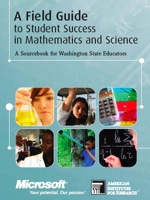A Field Guide to Student Success in Mathematics and Science
This publication should be viewed as a companion piece to the earlier Gateway report. That is, given the findings of the Gateway report, this Field Guide takes the next step by identifying key strategies and practices that educators can utilize to drive instructional change in their schools and school districts. Ultimately, the intent of this Field Guide is to be a resource for educators as they lead reform of middle school mathematics and science in their school communities. It provides superintendents, administrators, principals, and teacher leaders with ideas and recommendations for leading instructional improvements in their schools that are based on research and best practice.
 This Field Guide should be used by schools and districts to assist them in developing well-articulated and widely shared plans for creating middle schools where all students succeed. This Field Guide is organized to provide easy navigation to ideas and recommendations in a number of key areas. In particular, it provides detailed resources and recommendations in two major areas:
This Field Guide should be used by schools and districts to assist them in developing well-articulated and widely shared plans for creating middle schools where all students succeed. This Field Guide is organized to provide easy navigation to ideas and recommendations in a number of key areas. In particular, it provides detailed resources and recommendations in two major areas:
- Creating a shared vision of teaching and learning: Any strategy designed to improve student performance in mathematics and science must be grounded in a clear and shared vision of teaching and learning. This section of the Field Guide describes the key elements of an instructional vision that are based on research and best practice and that are critical to the ultimate success of any school or district reform initiative. These elements are imperatives that school leaders must put in place to ensure the success of their instructional reform program.
- Core components of successful mathematics and science programs: This section provides detailed recommendations in five areas that are the core components of successful mathematics and science programs in schools and districts. The materials associated with each of these components are included under a separate tab in order to provide ready access to the resources of each component. The five components are:
- Curriculum expectations and implementation
- Professional development and professional culture
- Assessment
- Data driven decision-making
- Community and stakeholder support
This Field Guide is not intended to be read at one sitting from cover to cover and then put away on a shelf; instead, readers are encouraged to turn to this report on a regular basis to inform their work in leading instructional change. Accordingly, it offers a wide variety of ideas, resources, and recommendations that can be tools for educators working to significantly improve middle school mathematics and science programs.
